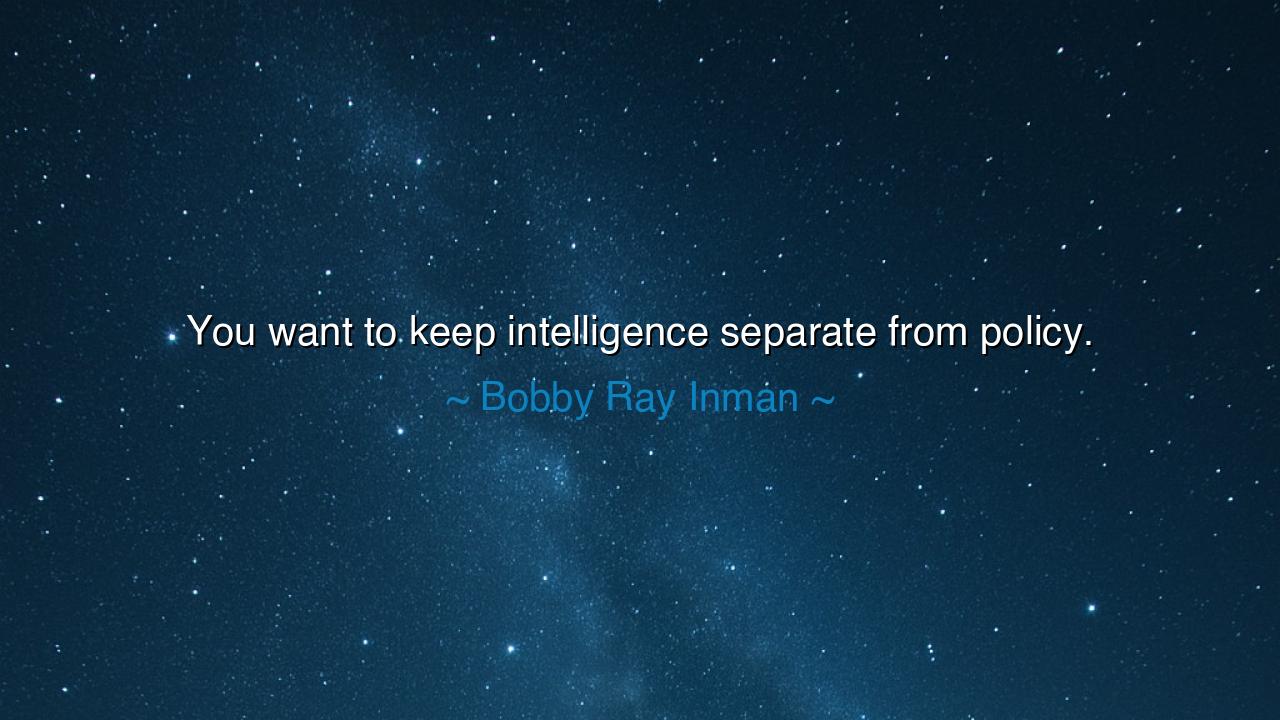
You want to keep intelligence separate from policy.






The words of Bobby Ray Inman, “You want to keep intelligence separate from policy,” echo through time like the sound of a bronze bell struck in a quiet temple. They remind us that wisdom and will, though they walk the same path, must not be bound by the same chain. For intelligence is the lamp that reveals the truth of the road, while policy is the traveler who must choose which way to go. When the lamp serves the traveler’s ego instead of the truth, both are lost in darkness.
Inman, a man forged in the crucible of American intelligence during the Cold War, spoke these words not as a philosopher in leisure but as a guardian of balance. He had seen what happens when rulers twist the mirror of knowledge to see only what they wish. In his time, nations gathered secrets as spiders gather dew, delicate yet dangerous. The purpose of intelligence was not to flatter power but to inform it without deceit. To mix policy—the art of choice—with intelligence—the art of truth—was to invite ruin, for one seeks victory, the other seeks understanding.
Consider the story of the Bay of Pigs in 1961. The intelligence officers who warned that Cuba was not ripe for rebellion were silenced by the fervor of policy-makers who wished it to be so. Thus, the seed of truth was buried under the soil of ambition. When the invasion failed, the waves carried not only men and metal but the trust between truth and power. The lesson was ancient yet forgotten: when policy bends intelligence, the truth becomes a servant to desire, and nations pay the price in blood and shame.
But when truth stands apart and speaks freely, wisdom reigns. Think of Abraham Lincoln during the dark night of the American Civil War. He sought not to shape reports to his will but to see the world as it was—harsh, unyielding, honest. He read the letters of his generals, weighed the words of spies, and sought clarity even when it wounded his hope. It was this humility before the truth that gave his decisions strength, and through it the Union endured. Thus, the separation of intelligence and policy is not a wall—it is a covenant of integrity.
In the heart of this teaching lies a warning for all generations: when men of power demand that truth conform to their designs, they corrupt both. The wise ruler must allow intelligence to speak with the voice of the unvarnished world, even when that voice trembles with displeasing news. To demand comfort from truth is to strangle it. The prophets of old were not loved for their foresight; they were feared because they spoke what others dared not hear.
And so, the lesson reaches beyond the halls of government. In each of our lives, we too must separate what we know from what we wish. In friendship, in love, in work—when we let desire rewrite fact, we betray our own clarity. The soul that confuses truth with intention soon wanders in self-deception. Let us be our own intelligence officers, gathering the quiet signals of honesty before making the policies of our hearts.
Let this be the practical wisdom: seek first to see, then to decide. In every act—before judgment, before speech—pause and ask, “What is true, apart from what I want?” That question is the boundary between blindness and understanding. The ancients called this the discipline of discernment. To practice it is to live with open eyes, even in darkness.
Remember then, O listener of ages yet unborn: truth must never kneel to desire. Keep intelligence separate from policy, and your path will be lit by the pure flame of understanding. For those who guard the truth, even when it burns their plans, walk in the company of the wise—and the world, though harsh, becomes a place of honest light.






AAdministratorAdministrator
Welcome, honored guests. Please leave a comment, we will respond soon